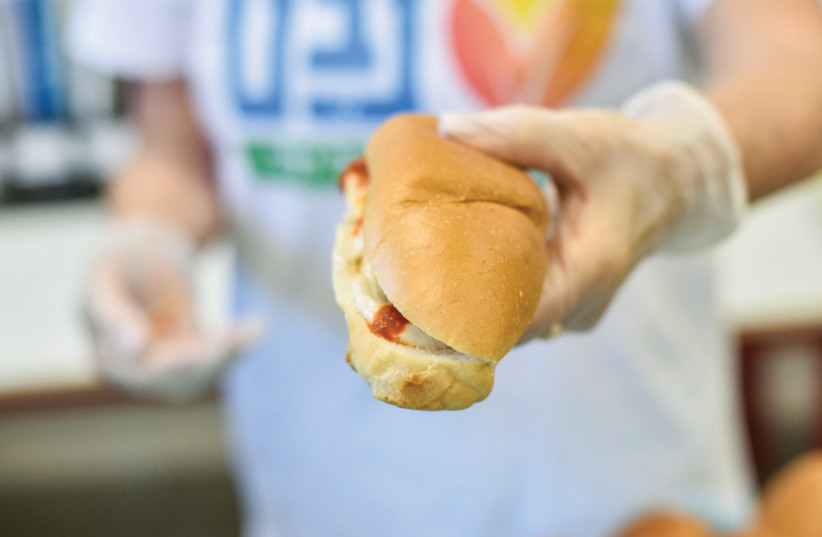In the land of milk and honey, schoolkids are going hungry.
For many children, the breakfasts and lunches served in school are the most nutritious part of their diet; they may be the only square meals they get and certainly the only time when they will be able to enjoy hot food. Sadly, however, school meals are not provided to children here from the age of 12, leaving many to fend for themselves.
According to the government’s National Insurance Institute, 776,500 children are living below the poverty line. Around 50,000 of those arrive at school without having had any breakfast. Many go hungry all day.
This can have a deleterious effect. An article in the scientific journal Human Neuroscience, written by Katie Adolphus, Clare L. Lawton and Louise Dye, posits a direct correlation between school breakfast programs and academic performance.

Giving Israeli schoolchildren sandwiches
The independent nonprofit charity Nevet helps address these problems by providing school meals to children from disadvantaged homes. Nevet is supported by private donors, whose gifts account for half of their revenues. The rest comes from places like ORT Israel, (a nongovernment organization devoted to education), local authorities and other official agencies.
Nevet provides 1.3 million breakfasts each year in the form of a sandwich. The children pick them up when they arrive in school, pop them into their school bags and usually eat them during their 10 a.m. break, along with their peers.
It is done discreetly and with the minimum of fuss so as not to cause embarrassment.
Each day 8,000 students at 130 schools across the country get such a sandwich.
Many of those children have no idea that it has been provided by Nevet. Instead, they assume that it is the school, or indeed their teachers who are responsible for giving them something to eat.
It’s a simple but effective idea. Nevet delivers the basic ingredients, which are overseen by their in-house nutritionist (whole wheat rolls, cream cheese, yellow cheese, tuna, hummus, tahini, olives, pickles) to schools. Then the school makes and stores the sandwiches.
Although there are in the region of 13,500 children on Nevet’s waiting list, they estimate that there are hundreds of thousands of others who could benefit from its program.
The organization is hopeful that a meeting with the Education Ministry will go some way to securing a much-needed nationwide program for school meals. Regrettably, this is still in its infancy due to the inability of recent governments to implement new schemes.
In the meantime, its aim is to keep going and help as many children as possible.
Due to the positive knock-on effects of the scheme, Nevet believes it provides more than just breakfasts; “it gives children the opportunity to succeed and break the cycle of poverty,” it says on its website, adding, “the program has been proven to reduce child delinquency, violent or disruptive behavior and school absences as it helps children stay in school and focus longer.”
The director of the recruitment and partnership department of ORT Israel also stresses the importance of Nevet’s work, seeing it as, “the only entity that assists us throughout the country, including in the haredi [ultra-Orthodox], secular, Arab, Bedouin and Druze sectors. Moreover, this contribution reaches every place in the country, even distant locations.”
Ultimately, it is the school staff who are responsible for the program’s success. Through the trust they build with their students, they are able to identify those in need and set the wheels of support in motion.
“There are many children in our school for whom severe hardship is part of their daily lives. When they arrive every morning and select their favorite sandwich, you can see the appreciation and gratitude on their faces.”
Petah Tikva school principal
One school principal in Petah Tikva has observed how a simple sandwich can mean so much to some children. “There are many children in our school for whom severe hardship is part of their daily lives. When they arrive every morning and select their favorite sandwich, you can see the appreciation and gratitude on their faces.”
If you would like to buy a sandwich for a child, contact them at https://www.nevet.org/sandwichforeverychild22/.
The writer is a former lawyer from Manchester, England. She now lives in Netanya, where she spends most of her time writing and enjoying her new life in Israel.
